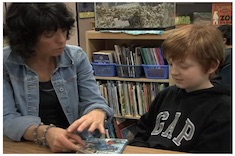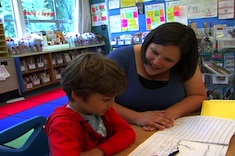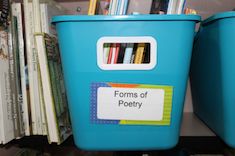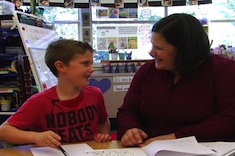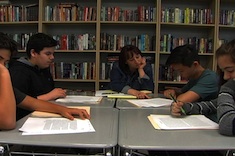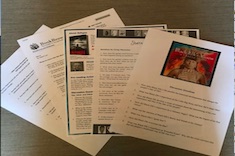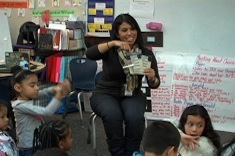Library
Choice Literacy Articles & Videos
The Choice Literacy library contains over 3,000 articles and 900 videos from 150+ contributors. Classic Classroom and Literacy Leadership subscribers have access to the entire library. Content is updated continuously, with five to six new features published each week.
Latest Content
Beyond Plot: Conferring with Ian
Andrea Smith confers with fourth grader Ian, who is plowing through a book series. She helps him look at the bigger picture of characters, themes, and how the series might end.
Reset
Christy Rush-Levine finds her students sometimes need to stop and be challenged to think in more positive ways about their reading abilities. She describes how she designs minilessons for impromptu resets in her middle school classroom.
December 28, 2018 Celebrations
We consider how literacy celebrations might be woven in the fabric of classroom and school life.
When Students Set Intentions
When students set intentions, reflection and celebration go hand in hand. Melanie Meehan explains how teachers can help students become more explicit about intentions with practical cues from bulletin boards and index cards.
First-Grade Writing Conference: Celebrations to Suggestions
Katrina Edwards begins her conference with first grader Allen by celebrating all he is doing well in his writing. She highlights his language and details in writing before moving on to new strategies to try.
Sharing Writing in a Class Celebration
Do celebrations matter? If you know Ruth Ayres, you know her answer is always a resounding YES. Here are her best tips for sharing writing in a class celebration.
November 17, 2018 Heat Maps
Writing poetry is the focus of this week’s Big Fresh.
Poetry Connections
Poetry writing always has the potential to spark some magic in students. Christy Rush-Levine finds this magic requires a few conditions to be in place first in her middle school classroom.
Past Midnight
Shirl McPhillips shares a poem she’s written about her grandmother Eva, and the fragments of memory that inspired it.
The Power of Similes
If you want stronger poetry from students, a good starting point might be to explore how to write a powerful simile. Gretchen Schroeder explains how she helps her high school students play with and create better similes.
The Big Fresh November 10, 2018 Just Keep Pedaling
Reading poetry is the focus of this week's Big Fresh.
The Big Fresh November 3, 2018 The Second Choice
We look at how teachers can use their writing to influence student writing in this week’s Big Fresh.
Pick a Poem
David Pittman delights in a student’s enthusiasm for poetry, leading him to reflect on how teachers often need to overcome their own negative history with poems to spark student love of the genre.
Hidden Treasures
Matt Renwick describes the process of paying attention to telling details, and gives practical advice for teaching this skill to young writers.
Being a Teacher Writer Is More Than Being a Teacher Who Writes
Ruth Ayres explains how the distinction between writers and teachers who write is subtle but essential for understanding mentoring in workshops.
The Third (or More) Time Is the Charm
Gretchen Schroeder finds helping her students see the value in rereading poems is all about helping them pay close attention to imagery.
Reading The Crossover: Fourth-Grade Reading Group
Gigi McAllister leads a group of boys who are just starting the novel in verse The Crossover in her fourth-grade classroom.
First-Grade Conference: Finding Seeds in Writing
Katrina Edwards confers with a first-grade writer and helps him unpack a narrative to use as seed writing.
The Big Fresh October 27, 2018 Stretching
We look at what constitutes evidence of learning in this week’s Big Fresh.
Evidence Claims in a Middle School Small Group
Christy Ruth-Levine leads a small group of eighth graders as they explore how to include textual evidence in their literary analysis essays.
Readers’ Guides: Helping Students Think About Informational Text
Suzy Kaback finds the task of creating readers’ guides helps students in the intermediate grades think about evidence in texts in more sophisticated ways.
Hunting for Textual Evidence
Gretchen Schroeder finds just telling her high school class to include textual evidence when making points and arming them with sticky notes leaves many students bewildered. She regroups and comes up with activities to scaffold their understanding of what makes for valid evidence.
The Big Fresh October 20, 2018 Crayons
We look at ways to make classrooms more comforting to students in this week’s Big Fresh.
The Right to Be Seen
Stella Villalba is at a loss when a teacher is hostile to a new English language learner in her classroom. She considers the unspoken challenges of welcoming students who may never have been in school before.
Shoulders-Down Spaces
Suzy Kaback feels rising unease as a tourist in unfamiliar neighborhoods. The experience provokes empathy for students who find classrooms strange or uncomfortable.
Reading Minilesson: A Good Partner
Katrina Edwards helps her first graders early in the year transition to more thoughtful reading partnerships through a minilesson at the start of the morning workshop.
The Big Fresh October 13, 2018 Raccoon
We look at creative takes on learning words in this week’s Big Fresh.
First-Grade Word Learning with Kinesthetics
Katrina Edwards teaches her first graders the word much using kinesthetics.
Retelling and English Language Learners
Retelling is an essential skill many English language learners struggle with. Stella Villalba finds tackling vocabulary in context is the key for many.
Teaching Tone: Deal Me In
Gretchen Schroeder’s high school students are surprised to see a deck of cards on their supply list. The cards are a tool for teaching the vocabulary of tone in creative ways.
Browse Content By
Type
Category
- Assessment Tools
- Big Fresh Archives
- Booklists
- Choice Numeracy
- Classroom Design
- Common Core
- Community Building
- Conferring
- Content Literacy
- Digital Literacy
- English Language Learners
- Equity
- Family Relations
- Free Samples
- Guiding Groups
- Leadership
- Literacy Coaches
- Mentor Texts
- Minilessons
- New Teacher Mentors
- Podcasts
- Poetry
- Quote Collections
- Reading Strategies
- Self Care
- Struggling and Striving Learners
- Talking and Listening
- Teacher Study Groups
- Teaching Reading
- Teaching Writing
- Word Study and Vocabulary
Author
- Melissa Quimby
- Nawal Qarooni
- Gwen Blumberg
- Julie Cox
- The Lead Learners
- Hannah Tills
- Josie Stewart
- Ruth Metcalfe
- Mallory Messenger
- Becca Burk
- Jodie Bailey
- Vivian Chen
- Mary Brower
- Tiffany Abbott Fuller
- Stephanie Affinito
- Ruth Ayres
- Leigh Anne Eck
- Heather Fisher
- Shari Frost
- Julie Johnson
- Suzy Kaback
- Gigi McAllister
- Shirl McPhillips
- Melanie Meehan
- Cathy Mere
- Debbie Miller
- Tara Barnett and Kate Mills
- Tammy Mulligan
- Dana Murphy
- Bitsy Parks
- David Pittman
- Brenda Power
- Heather Rader
- Matt Renwick
- Mandy Robek
- Christy Rush-Levine
- Gretchen Schroeder
- Jen Schwanke
- Brian Sepe
- Katherine Sokolowski
- Stella Villalba
- Jennifer Vincent
Grade Level
Choice Literacy Membership
Articles
Get full access to all Choice Literacy article content
Videos
Get full access to all Choice Literacy video content
Courses
Access Choice Literacy course curriculum and training

